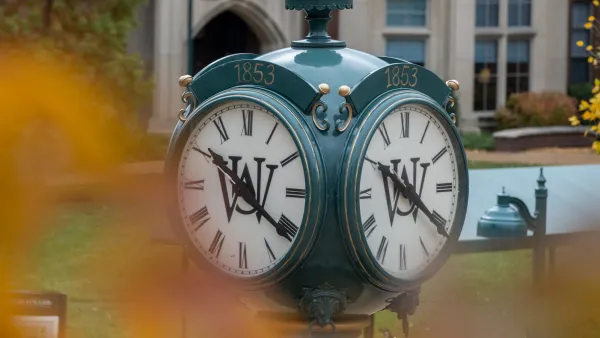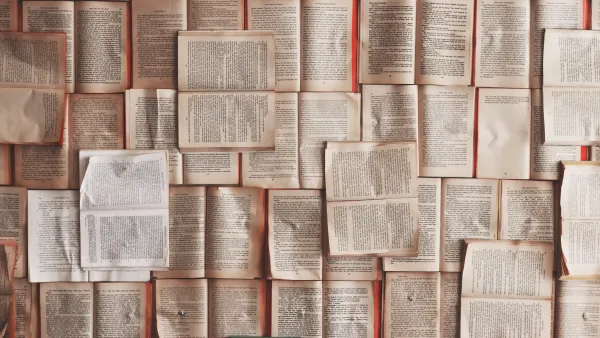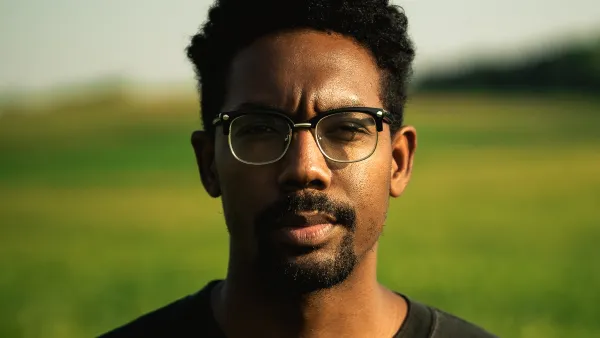Assistant Director for Research and Public Engagement Laura Perry brings the Sumner StudioLab’s story on the road, sharing its new model with colleagues around the country.
The Sumner StudioLab begins its second year this month, having wrapped up its inaugural year in June. The community hub and classroom space brings together students from Sumner High (the oldest high school for African American students west of the Mississippi), WashU students, and residents from the surrounding Ville neighborhood. Initially funded by Washington University’s Divided City initiative, itself supported by the Mellon Foundation, the project was just boosted by an additional three years of funding from the Office of the Provost through the Here and Next initiative. Now, the organizers behind the innovative community-academic space are redoubling their efforts to support neighborhood projects and share these stories with community-engagement colleagues around the country — and around the world. This is sparked by the Studiolab’s Community Advisory Committee, who want more to hear about the innovative collaborations happening at Sumner High School, of which the StudioLab is one part, and charged them to get the word out!
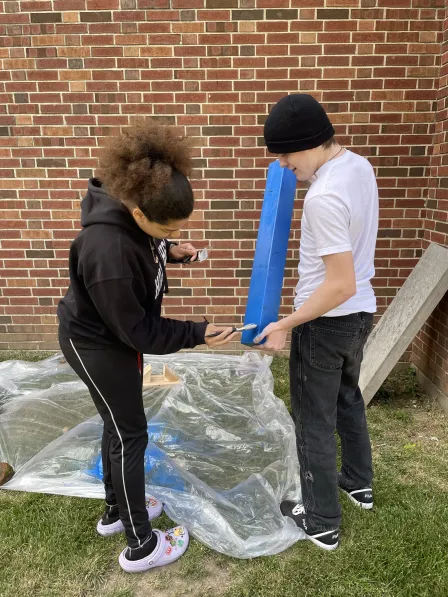
At the summer 2023 annual meeting of the Consortium of Humanities Centers and Institutes in Santiago, Chile, co-organizer Laura Perry, assistant director for research and public engagement in the Center for the Humanities, was struck by the eagerness with which her fellow attendees asked about the Sumner StudioLab. “Public engagement is a core goal for many humanities centers, but it’s often hard to know how to start and sustain those campus-community relationships, and how to make sure they are mutually beneficial,” Perry says. “That’s something that makes WashU’s center stand out — the years of building trust and collaborations with partners and organizations in the Greater St. Louis region from directors, faculty, and staff, long before I got involved, or my co-organizer Matt [co-organizer Matthew Bernstine, associate director in Office of Socially Engaged Practice at the Sam Fox School].”
On October 6, Perry will join a panel discussion led by Bernstine on “Rooted Community Engagement: Reflections on Building Town/Gown Partnerships” at the Society of College and University Planning’s (SCUP) North Central Regional Conference. Together with Laura Ginn, city vacancy strategist, St. Louis Development Corporation; and Aaron Williams, WashU BA ’08, 4theVille co-founder, Sumner Recovery Board chair, the group will discuss community-based town/gown partnerships, pluralistic models for long-term projects, and methods of maintaining community participation. The panel will address the question, What is a university’s responsibility to its home city?
Several recent humanities center guest speakers have emphasized this question, including Davarian Baldwin (“What Good Is Higher Education for Our Cities?”) and Mary Schmidt Campbell (“Do Colleges and Universities Bear Responsibility for K-12 Public Education?”). “This question is always on my mind, as someone in a role involving community engagement,” Perry says. “How do we design programming that is not only welcoming and interesting to off-campus partners, but also acknowledges their expertise and responds to their tangible needs?”
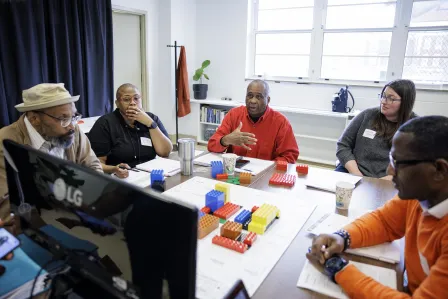
A recent workshop held at the Sumner StudioLab provides a case in point. During an UrbanPlan training facilitated by Williams (SCUP co-panelist), local community leaders used Legos to learn the ins and outs of community development. The exercise asked them to consider every angle of community development, from finances to petitions, from building a skate park to renovating a theater.
“The collaborative process of building those Lego models offers a larger lesson: It doesn’t make sense to design community-engaged projects without talking to community partners first, especially since we can often be most helpful by supporting existing projects rather than trying to reinvent the wheel without listening to local experts with lived experience,” Perry says. The workshop itself had to first be approved by the StudioLab’s Community Advisory Committee, a group of Ville residents and local leaders that ensures programming aligns with neighborhood interests.
Speaking to academic audiences is only one piece of their work to amplify the collective Sumner efforts. In addition to presenting at the the 2023 Modern Language Association annual convention and the 2023 Urban Humanities conference, their conversations continue with colleagues in St. Louis, too. Perry says: “We talk with Ville residents, local community leaders and the Sumner High School community about their feedback on the project. Now that we know the project can continue, we will be creating future programming together, in conversation.” That open line of communication will facilitate the StudioLab’s next three years, which during which it will host community-engaged WashU courses in the StudioLab space, support the work of community partners, offer workshops open to the public, and mentor Sumner High School interns.

Says Perry: “Let’s take seriously the promise of the WashU strategic plan — in St. Louis, for St. Louis. For universities to be good neighbors, and for humanities faculty and students to be good community members, it’s essential to engage with the different communities living right down the block from the campus borders.”
Headline image: High school students created buttons at a workshop on the history of button-making and activism held at the Sumner StudioLab and organized by Community Advisory Committee member C.J. Mitchell. Photo by Virginia Harold.

